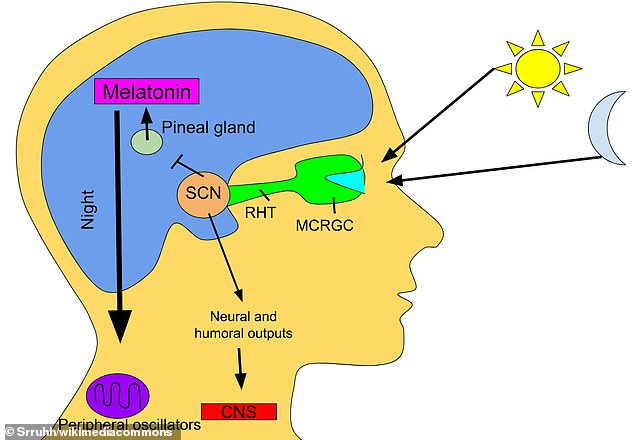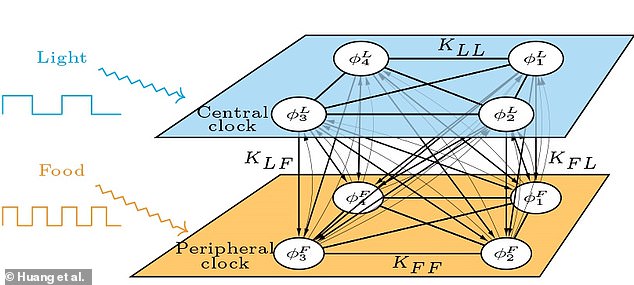Scientists think they finally have a solution to jet lag – and say it’s all about what and when you eat
>
Every travel enthusiast knows the frustration of arriving in an exciting new location and wanting to explore it before being hit by debilitating jet lag.
Fortunately, scientists in the US think they finally have a solution – and they claim it’s all about what and when you eat.
They say consuming a single, larger meal early in the morning for three days after landing can cause head jet lag, though the older you get, the less likely it will work.
The experts agree that a walk in the sun is also a good tip, so combining this with the new advice can help fliers find the best path to recovery.
It is already known that one of the worst things you can do against jet lag is to refuse to adjust to your new time zone, such as going to sleep during the day.
Jet lag is caused by a difference between the circadian system (the body’s internal clock) and the environment
The new study was conducted by experts from Northwestern University in Evanston, Illinois, and the Santa Fe Institute in New Mexico.
“Having a larger meal in the early morning of the new time zone may help overcome jet lag,” said study author Yitong Huang of Northwestern University.
“Constantly shifting meal schedules or eating a meal in the evening is not recommended, as this can lead to misalignment of internal clocks.”
Jet lag is caused by disruptions of the innate biological clock in humans, called the circadian rhythm, which regulates when we become sleepy and when we are more alert.
Modern research has shown that circadian clocks are present in almost every cell and tissue of the human body, and can vary from organ to organ.
For example, the master clock in the brain is a group of about 20,000 nerve cells that make up a structure called the suprachiasmatic nucleus (SCN) that receives direct input from the eyes.
The brain’s clock can be reset by exposure to sunlight. Therefore, people suffering from jet lag are advised to enjoy the daylight in their new location instead of falling asleep.
More specifically, sunlight affects the production of a hormone called melatonin (produced by the pineal gland in the brain), which helps regulate sleep.
When we are exposed to sunlight, melatonin production is suppressed, keeping us awake during the day.

When the eyes receive light from the sun, the production of melatonin by the pineal gland is inhibited and the hormones produced keep us awake. When the eyes do not receive light, melatonin is produced in the pineal gland and the human gets tired
Meanwhile, peripheral organs like the stomach and liver have their own separate clocks that are recalibrated by food — namely what and when we eat.
Jet lag can develop when these clocks are out of sync with each other, the research team says.
“Conflicting signals, such as warm weather during a short period of light or nighttime eating — eating when your brain is about to rest — can confuse internal clocks and cause desynchronization,” says Huang.
For the study, the authors used computer software to study the interactions between multiple internal clocks with jet lag, and how this is affected by aging.
They built a model consisting of two ‘oscillators’ stacked on top of each other – one representing the clock controlled by sunlight and the other representing the clock controlled by food.
Using this model, the team was able to investigate how such a coupled system can be disrupted and what makes the effect worse.
The results suggested that consuming one meal a day in the early morning for the first three days — but with three times the amount of food — is the best option.
“Of the types of meal schedules we compared (equal meals, dinner at night, eating on the old schedule), one schedule with a strong input in the morning was better than the others for promoting recovery from jet lag,” Huang said. to Mail Online.
However, aging results in weaker signals between circadian clocks and lower sensitivity to light, the team also found.

The illustration shows the team’s mathematical model. It consists of two populations of coupled oscillators, with one population representing the central clock in the brain, influenced by light, and the other population representing a peripheral clock, influenced by food. Each white circle represents a cell
This means that older people with jet lag after a long flight may need more days to recover than younger people.
The authors plan to explore the other side of the equation and identify the factors that result in more resilient internal clocks.
Such discoveries could result in recommendations to avoid jet lag altogether, or to keep the circadian system healthy well into old age.
The team admits that little is known about how the body’s various internal clocks affect each other, though they refer to the brain as the “central clock” because it coordinates all other clocks.
“Experimental data clearly demonstrate a hierarchical network of clocks in mammalian animals and these clocks respond to different external stimuli,” they say in their paper, published in the journal Chaos.
“Therefore, a mathematical framework that incorporates both the central and peripheral clocks is needed to advance our knowledge of circadian rhythms.”

